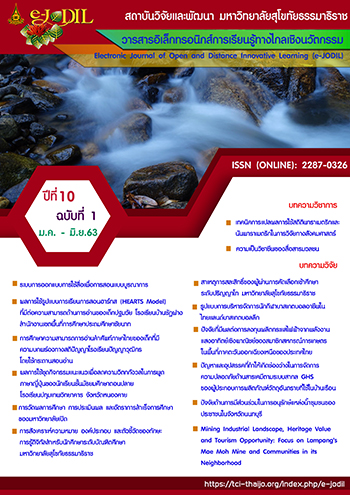การสังเคราะห์ความหมาย องค์ประกอบ และตัวชี้วัดของทักษะการรู้ดิจิทัลสำหรับนักศึกษาระดับบัณฑิตศึกษามหาวิทยาลัยสุโขทัยธรรมาธิราช
Main Article Content
บทคัดย่อ
การวิจัยนี้มีวัตถุประสงค์เพื่อสังเคราะห์ความหมาย องค์ประกอบ และตัวชี้วัดของทักษะการรู้ดิจิทัลสำหรับนักศึกษาระดับบัณฑิตศึกษามหาวิทยาลัยสุโขทัยธรรมาธิราช การดำเนินการวิจัยเริ่มต้นจากการทบทวนวรรณกรรมเพื่อสร้างกรอบแนวคิดตั้งต้นสำหรับเป็นข้อมูลในการสนทนากลุ่มและการสัมภาษณ์เชิงลึก กลุ่มผู้ให้ข้อมูลจำแนกเป็น 2 กลุ่ม ได้แก่ กลุ่มที่ 1 กลุ่มอาจารย์ในระบบการศึกษาทางไกล จำนวน 10 คน และกลุ่มที่ 2 กลุ่มนักศึกษาระดับบัณฑิตศึกษา มหาวิทยาลัยสุโขทัยธรรมาธิราช จำนวน 12 คน เครื่องมือที่ใช้ในการวิจัย จำแนกเป็น 2 ส่วน ได้แก่ ส่วนที่ 1 เครื่องมือสำหรับการสนทนากลุ่ม ประกอบด้วย 1) แบบบันทึกประวัติของผู้ทรงคุณวุฒิ 2) เอกสารสรุปความหมายและองค์ประกอบของการรู้ดิจิทัล 3) ประเด็นการสนทนากลุ่ม และ 4) แบบบันทึกการสนทนากลุ่ม ส่วนที่ 2 เครื่องมือสำหรับการสัมภาษณ์เชิงลึก ประกอบด้วย 1) แบบสอบถามความคิดเห็นของนักศึกษา และ 2) ประเด็นการสัมภาษณ์เชิงลึก การวิเคราะห์ข้อมูลดำเนินการโดยการถอดเทปจากการสนทนากลุ่มและการสัมภาษณ์ จัดระเบียบข้อมูล สรุปข้อมูล และสังเคราะห์ความหมาย องค์ประกอบ ตัวชี้วัดของทักษะการรู้ดิจิทัลของนักศึกษาระดับบัณฑิตศึกษา มหาวิทยาลัยสุโขทัยธรรมาธิราช
ผลการวิจัย พบว่าการรู้ดิจิทัล (สำหรับนักศึกษาระดับบัณฑิตศึกษา มหาวิทยาลัยสุโขทัยธรรมาธิราช) หมายถึง กลุ่มของทักษะความสามารถที่จำเป็นต่อการดำรงชีวิตส่วนตนและการเรียนรู้ในระบบการศึกษาทางไกล จำแนกเป็น 8 องค์ประกอบ ได้แก่ (1) พื้นฐานคอมพิวเตอร์ มี 25 ตัวชี้วัด (2) การป้องกันความเสี่ยง มี 12 ตัวชี้วัด (3) ซอฟต์แวร์ประยุกต์ มี 37 ตัวชี้วัด (4) ความถูกต้องเหมาะสม มี 12 ตัวชี้วัด (5) พื้นฐานอินเทอร์เน็ต มี 22 ตัวชี้วัด (6) การค้นหาสารสนเทศ มี 15 ตัวชี้วัด (7) การติดต่อสื่อสาร มี 28 ตัวชี้วัด และ (8) การเรียนการสอนออนไลน์ มี 14 ตัวชี้วัด
Downloads
Article Details
บทความ ข้อความ ภาพประกอบ ตารางประกอบ ที่ตีพิมพ์ในวารสารเป็นความคิดเห็นและความรับผิดชอบของผู้เขียนแต่เพียงผู้เดียว ไม่เกี่ยวข้องกับมหาวิทยาลัยสุโขทัยธรรมาธิราชแต่อย่างใด
บทความที่เสนอพิจารณาในวารสาร e-JODIL ต้องเป็นบทความที่ไม่เคยส่งไปลงพิมพ์ เผยแพร่ หรืออยู่ระหว่างการพิจารณาของวารสารอื่น
กองบรรณาธิการขอสงวนสิทธิ์ในการพิจารณาและตัดสินการตีพิมพ์บทความในวารสาร
เอกสารอ้างอิง
Bawden, D. (2001). Information and digital literacies: A review of concepts. Journal of Documentation, 57(2), 218–259.
Certiport. (2017). IC3 Digital literacy certification. Retrieved October, 24, 2017, from https://certiport. pearsonvue.com/Certifications/IC3/Digital-Literacy-Certification/Certify /IC3-Global-Standard-5
Eshet, Y. (2012). Thinking in the digital era: A revised model for digital literacy. Issues in Informing Science and Information Technology, 9, 267-276.
Glister, P. (1997). Digital literacy. New York: Wiley.
Hague, C. & Payton, S. (2010). Digital literacy across the curriculum. Retrieved March, 1, 2018, from www.futurelab.org.uk/projects/digital-participation
Hobbs, R. (2011). Digital and media literacy: Connecting culture and classroom. Thousand Oaks, California: Corwin Press.
Institute of Educational Technology, the Open University. (2017). Digital and information literacy framework. Retrieved October, 24, 2017, from http://www.open.ac.uk/ libraryservices/pages/ dilframework/
Martin, A. (2006). Literacies for the digital age. In A. Martin & D. Madigan (Eds.), Digital literacies for learning (pp. 3-25). London: Facet.
Martin, A., & Grudziecki, J. (2006). DigEuLit: Concepts and tools for digital literacy development. Innovation in teaching and learning in information and computer sciences, 5(4), 1-19. http://DOI: 10.11120/ital.2006.05040249
National Science and Technology Development Agency. (2015). Digital literacy. Retrieved September, 22, 2018, from https://www.nstda.or.th/th/nstda-knowledge/2632-digital-literacy (in Thai)
Ng, W. (2012). Can we teach digital natives digital literacy?. Computers & Education, 59(3), 1065-1078. http://DOI: 10.1016/j.compedu.2012.04.016
Northstar Digital Literacy Project. (2018). The Standards. Retrieved October, 10, 2018, from https://www.digitalliteracyassessment.org/
Office of the Civil Service Commission. (2018). What is digital literacy?. Retrieved March, 1, 2018, from http://www.ocsc.go.th/DLProject/mean-dlp (in Thai)
Saechan, T., & Morsorn T. (2016). Digital literacy: Definition, component and current situation. Journal of Information Science, 34(4), 116-145. (in Thai)
Sukhothai Thammathirat Open University. (2015). Distance education (1st Revision). Bangkok: Sangchan Publisher. (in Thai)
The constitution of the United Nations Educational, Scientific and Cultural Organization (UNESCO). (2018). A Global Framework of Reference on Digital Literacy Skills for Indicator 4.4.2. Montreal: UNESCO Institute for Statistics.
The Open University. (2012). Being digital: Digital literacy skills checklist. Retrieved October, 13, 2018, from http://www.open.ac.uk/libraryservices/pages/dilframework/self_assessment _checklist.pdf


